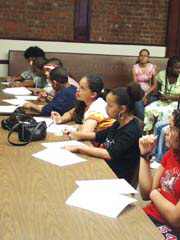Bucking a national trend of government money drying up for teenagers’ summer jobs, the city of Hoboken has started its own program to put more than 60 local 13- to 15-year-olds to work.
Recently, dozens of teens packed the conference room in the basement of City Hall to fill out applications for city jobs. According to City Councilman Ruben Ramos Jr., who helped spearhead the creation of the program, most of the students will be working in the Department of Recreation, where they will be assisting in operation of the city’s summer recreation program.
He added that the program will pay the teenagers minimum wage or $5.15 an hour. The youths will work two hours per day, five days per week.
"The goal of the program is to instill a work ethic and responsibility in these school-aged teenagers," said Ramos, who grew up in the Hoboken Housing Authority.
Ramos added that Hoboken’s teen job program is modeled after the federal Comprehensive Employment Training Act (CETA) program of the mid- and late-1970s that provided job opportunities and training, particularly for teenagers from low-income families.
"The program had such an incredibly positive and lasting effect on teenagers," he said. "We felt that it would be a great benefit to Hoboken teens to bring back many of those same opportunities."
At the program’s kick-off meeting, held Monday, June 30, Mayor David Roberts welcomed the local youths into the program.
"It says something about your character that you are willing to spend your summer in such a creative way," said Roberts. "Summer employment opportunities provide you with valuable experience that can improve your performance in the classroom and prepare yourselves for future careers."
Low budget
The total budget for the program is $75,000, and has already been approved and fully funded by the City Council, with the support of the mayor, said the mayor’s spokesperson, Bill Campbell.
Also helping to coordinate the program are officials from the Hoboken Housing Authority. Every day, after the teens’ shifts are finished, the participants who live in the Housing Authority are invited to attend the Crossfire Teen Group, an afternoon school program in the Housing Authority.
Every day, youths ages 12 to 18 gather to learn lessons about pressing teen topics such as drug abuse, peer pressure, teen sex, smoking, and teen pregnancy. The group often has speakers and open discussions about the difficult issues teens often face daily.
According Housing Authority officials, in addition to the educational aspects, the teens participate in computer lessons, arts and crafts activities, cooking classes, field trips, volunteer events, and mixers with teens from other area housing authorities.
"In the mornings they can work for the city and in the afternoon they participate in the Crossfire Teen Group," said Ruben Ramos Sr., who works for the Housing Authority and is the program’s coordinator.
Tough to come by
In the past two years, jobs for teenagers have been increasingly hard to obtain. According to a recent report commissioned by the National League of Cities (NLC) Institute for Youth, Education, and Families, this will be the worst job market for teens in 37 years.
The report cites a faltering national economy as the principal cause of teens’ labor market difficulties, but argues that the elimination of federal funding specifically earmarked for summer jobs programs as well as state and local budget crises have exacerbated these problems.
"Despite the progress we made in the 1990s, this nation’s teens have been bumped down the queue by out-of-work older adults and college grads entering the job market," said Andrew Sum, director of the Center for Labor Market Studies and lead author of the report. "It promises to be a long, hot, jobless summer for American teenagers."
Tracking the employment rates over the past three years during both winter and early spring months, researchers found that the employment rate of teens between January and April 2003 had declined to 37.3 percent, eight percentage points below that for the same four-month period just two years ago, the report reads.
While the job-finding rates of teens fell across the demographic spectrum, employment rates for black and Latino teens were far lower than the average for white teens for the summer of 2002.
Among white teens, 42.3 percent were employed compared to 37.3 percent of Latino teens and just 24.3 percent of black teens.
Employment rates for teens from low-income families and from central cities also tend to be much lower than the average.
The likelihood of summer employment among the nation’s teens was found to vary considerably along four variables: Their family’s income, their schooling, their race/ethnic origin, and the geographic location of their residence.
Across the Hudson River in New York City, a statewide and city budget crunch nearly crippled the state’s Summer Youth Employment Program. As recently as May, New York Gov. George Pataki threatened to ax funding, leaving only 5,000 teen jobs, which would have been a huge step down from the over 50,000 that were offered as recently as 1999.
Only after a last minute intervention on June 26 were funds allocated to allow for 20,000 jobs this summer.
